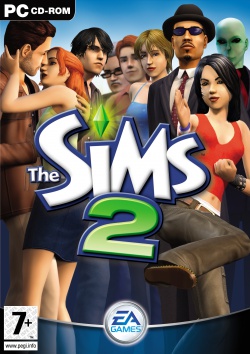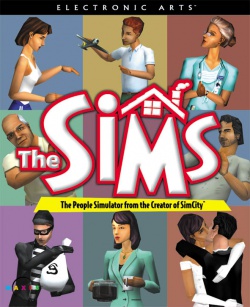GameSpy.com Looks At The Sims Through the Years
Members of the Sims development team reminisce about what they learned over the five years since the release of the original game.
The Sims Through the Years
By Dave 'Fargo' Kosak
Members of the Sims development team reminisce about what they learned over the five years since the release of the original game.
It was five years ago this February -- when we all stepped out of our bunkers and realized the Y2K bug didn't destroy the planet at the end of 1999 -- that The Sims was released to near universal confusion and acclaim. Confusion because nobody knew how to categorize the game or how to talk about it. Acclaim because underneath the seemingly mundane gameplay lurked a brilliant toy, one that fired the imaginations of players and spawned a massive community. The Sims and its expansion packs went on to sell tens of millions of units worldwide, a streak of success that's continuing with the sequel.
We've already spoken with game designer Will Wright about the early days of the franchise and the battles he fought to bring it to life. Today we're taking a quick survey of the entire team, gathering up a cross-section of their experiences over the past five years (and earlier!) as they worked to build and expand on one of the best-selling game franchises of all time. Here's how it all went down in their own words:
Joe Maris
QA Engineer (Sims Online), Software Engineer (Sims Bustin' Out), Designer (Urbz and unannounced projects)
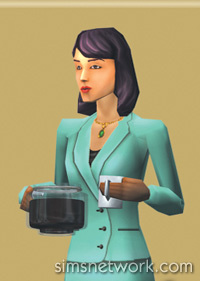 Working on the Sims has completely transformed my relationship with normal, everyday objects. You haven't lived until you've attended an hour long meeting on toilets. Previous to my employment, the common household toilet occupied a bare minimum percentage of my daily thoughts, but I now understand that the toilet is an object of great human potential, providing users with joy, horror, and an excuse to read Vogue magazine.
Working on the Sims has completely transformed my relationship with normal, everyday objects. You haven't lived until you've attended an hour long meeting on toilets. Previous to my employment, the common household toilet occupied a bare minimum percentage of my daily thoughts, but I now understand that the toilet is an object of great human potential, providing users with joy, horror, and an excuse to read Vogue magazine.
The biggest challenge is designing these common household objects in a believable way. If I am designing a Cybernautical Sleeping Chamber Number 9, I have some lee-way, because I don't think anyone knows exactly what this is, including me. But if I am designing a coffee maker, I need to be sure to include everything a person expects to see on a coffee maker or I have failed.
But by far the best thing about working on the Sims is working with the Maxis team. Lots of teams say, "our team is the best, blah blah blah," but our team really is the best, so bring it. My last comment aside, however, we don't tend to breed too many hardcore ego types here because I think there is something ultimately humble about making a game where people pee on the floor. How exactly would someone build an over-inflated sense of self-esteem based on an effective urine algorithm? Our people are just ... nice and fun ... except for Sean, who is bitter and fun.
Sinjin Bain
V.P. / Executive Producer of The Sims Franchise
 When we shipped The Sims 5 years ago, no one had any idea the level of success we would have, and where we would take the franchise. An example of this is that when we shipped The Sims, we hadn't really even considered "expansion products," and of course those have been core to our success. The first pack, Livin' Large had a 50% tie ratio to the base product, and unheard of sales figure... so we thought, 'hey, this is a pretty interesting business strategy.' We also didn't really understand how vibrant our community would become, and how important our web development efforts are, with downloadable tools for customization and new content for downloading.
When we shipped The Sims 5 years ago, no one had any idea the level of success we would have, and where we would take the franchise. An example of this is that when we shipped The Sims, we hadn't really even considered "expansion products," and of course those have been core to our success. The first pack, Livin' Large had a 50% tie ratio to the base product, and unheard of sales figure... so we thought, 'hey, this is a pretty interesting business strategy.' We also didn't really understand how vibrant our community would become, and how important our web development efforts are, with downloadable tools for customization and new content for downloading.
After 2 years of focusing on the PC we decided to try and see what it would take to move the franchise to consoles and handhelds, which was a tremendous challenge for several core reasons. We basically had to figure out how to redesign the game to match console and handheld game play sensibilities, and not lose the core sense of people simulation. It was really gratifying to ship these new products and have success, with the first console version of the Sims actually knocking Vice City out of #1 on the charts and eventually selling over 4M units. The GBA version of The Sims was the #1 EA GBA game the year it shipped, outpacing Lord of the Rings and other EA titles.
Currently we are working on things we NEVER imagined we would be doing 5 years ago, and it is VERY exciting and challenging. New handheld and console platforms are on the horizon for us to consider, and the first of our Sims 2 expansion products is in stores. WOW.
The bottom line is that The Sims was so successful in unexpected ways, we had to move quickly to take advantage of this success. Maxis grew from about 80 people when we shipped to over 400 people based on the success of The Sims Franchise... and our success is the direct result of the great people working at Maxis.
Jonathan Knight
Sr. Producer (Vacation, Unleashed, Superstar, Magic, Sims 2)
My biggest challenge was working with a team to bring Pets to life in The Sims Unleashed. It was like making an all new type of Sim, and we only had about 4 months to do it. But when we saw that little virtual tail wagging on screen, we knew we were doing the right thing!
Eric Chin
Character Artist (The Sims, Livin' Large, House Party, Hot Date, Sims 2, University)
Well, my whole career so far has been Sims related. I've been here Since '98 working on the original Sims, touched three expansion packs, numerous marketing downloads, turned actors into Sims for TV commercials, first artist on Sims 2, now one expansion pack down and another in the pipe. So you could say I've been around the Sims a long time.
All of it building characters.
I built them all myself on the original Sims with no other help and pretty much started the whole ball rolling for Sims 2.
I would have to say that the biggest challenge was maintaining the feel of Sims from one product to the next because of the huge differences between the two, not from a design perspective, but from a scope perspective.

For the original Sims I was brought in as the character specialist. We went through various character design and technology phases to end up with a pretty robust system. But the pressure was low. Our projected numbers for a successful product was in the hundreds of thousands -- until we hit that first E3. Then the rave reviews pushed our marketing budget through the roof and then we had a bona fide hit on our hands. Thankfully, all the extras we put into the game made it worthy of that success. The features I put into the design and flexibility of the original Sims characters was pretty large I thought, but I never expected it to get to the point where there were tens of thousands (or more?) of different Sims made by fans available.
Fast forward to Sims 2 and now we need to make an even more successful version. No pressure, heh heh. Character design kind of just flowed into a natural progression for me since there were fears all over about how to proceed. "Stay the same" or "go forward" but "not too far" were all various pressures floating around. The basics of the character design stayed mostly the same, though the influx of ideas, features and other artists made it more the work of a team than any one individual. While only time can tell how successful this next version will ultimately be, it seems to be doing well.
I think the part I like the best will have to be with the original Sims. It was a fairly small development team for most of its cycle, where individual ideas and their owners could make a big difference making the game. We hoped it would do well and the success of it just kept going and going. It was a beautiful thing to watch.
Eva Beck-Erismann
Animator (Bustin' Out, Urbz, and an unannounced product)
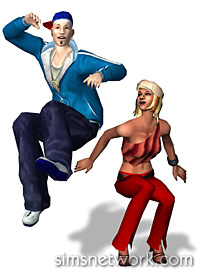 The best part about working on the Sims is that, as an animator, you get to really do character animation. We animate socials where the Sim characters really get to interact with one another either in positive ways or negative ways. It's super cool to work on the console side because we are allowed to go as wacky as we want and really push the envelope on the socials the characters do, everything from a horsey-ride animation to pretending the characters are barnyard animals to love scenes and wrestling! Generally on other games you only get to do character animation in cutscenes, but here you really get to do the fun animation in the game, stuff that everyone will see and play!
The best part about working on the Sims is that, as an animator, you get to really do character animation. We animate socials where the Sim characters really get to interact with one another either in positive ways or negative ways. It's super cool to work on the console side because we are allowed to go as wacky as we want and really push the envelope on the socials the characters do, everything from a horsey-ride animation to pretending the characters are barnyard animals to love scenes and wrestling! Generally on other games you only get to do character animation in cutscenes, but here you really get to do the fun animation in the game, stuff that everyone will see and play!
Also working on console we are encouraged to watch as much of MTV and other popular hit shows and really explore the city for what's hip hop and happening so we can inject that energy into the game. Sometimes we go into the city and just bring a camera with us and film stuff out of the car window, or go on campus and film ourselves acting out all the scenes we will be animating.
Also, having worked on lots of console titles, we get to have lots of responsibility when it comes to pre production. Everyone on the team has been grouped into cells, and that enables the whole team to develop the game from the ground up. Being in the social cell, we get to develop the visual look, the feel, and the way the socials will work in the next game: like how characters will interact, how the camera will work, how lighting will affect the mood and the scene around you etc... really cool stuff that you don't get to really develop in other studios.
Alex Hutchinson
Designer (The Urbz)
Reinventing the Sims for a city setting in The Urbz: Sims in the City was a huge challenge, but one issue that stood out unexpectedly was communicating our aim clearly. We wanted players to realize that the game was a parody of a city life in the same way that the Sims is a parody of suburban life -- we didn't want people to think we were creating 'Sims Street.' Getting this message out turned out to be a much larger problem than we'd anticipated.
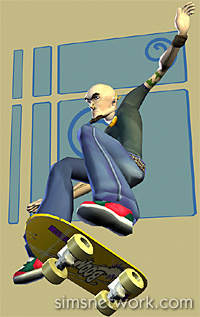 The Sims was always a parody of consumerism: All you do is disappear to an invisible workplace to make money to spend on furniture to make yourself comfortable to go to work again before you die. The Urbz was envisioned as a parody of conformism: You move in with a youth subculture then try to 'fit in' with them by imitating them to gain reputation, before abandoning them and moving on to a more fashionable crowd.
The Sims was always a parody of consumerism: All you do is disappear to an invisible workplace to make money to spend on furniture to make yourself comfortable to go to work again before you die. The Urbz was envisioned as a parody of conformism: You move in with a youth subculture then try to 'fit in' with them by imitating them to gain reputation, before abandoning them and moving on to a more fashionable crowd.
Part of the problem is that The Sims and The Urbz are such unique games, and trying to describe them in a way that marketing or the press can distill into a sound bite is problematic. They're the weird unfashionable cousin of the rest of the games industry, and designing them is alternately the best experience a designer could have and a recipe for a pulmonary embolism.
More Stories from the team:
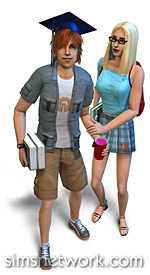 Johnson Lee, Maxis QA Lead: The biggest challenge for me was to coordinate and lead the efforts of testing The Sims franchise in 20 different languages. The Sims franchise kept growing with the latest Hungarian language added to The Sims 2 University. Because of the time zone differences, there were many all-nighters coordinating with the various offices in the territory. The favorite part was when the product is shipped; I know I have ensured the best quality game shipped throughout the world.
Johnson Lee, Maxis QA Lead: The biggest challenge for me was to coordinate and lead the efforts of testing The Sims franchise in 20 different languages. The Sims franchise kept growing with the latest Hungarian language added to The Sims 2 University. Because of the time zone differences, there were many all-nighters coordinating with the various offices in the territory. The favorite part was when the product is shipped; I know I have ensured the best quality game shipped throughout the world.
Jeff Lillard, Audio Asset Manager: The best part of my job is hearing the finished product come together and sound as good as it does. Also, sitting in on the voice talent recording sessions is really fun! The challenges are keeping track of the hundreds of individual sounds (from design spec through hooking up the sound in the game).
Michael McCormick, Game Designer: My favorite part? Designing the 7 kinds of kisses for Hot Date was one of my first job responsibilities at Maxis.
















